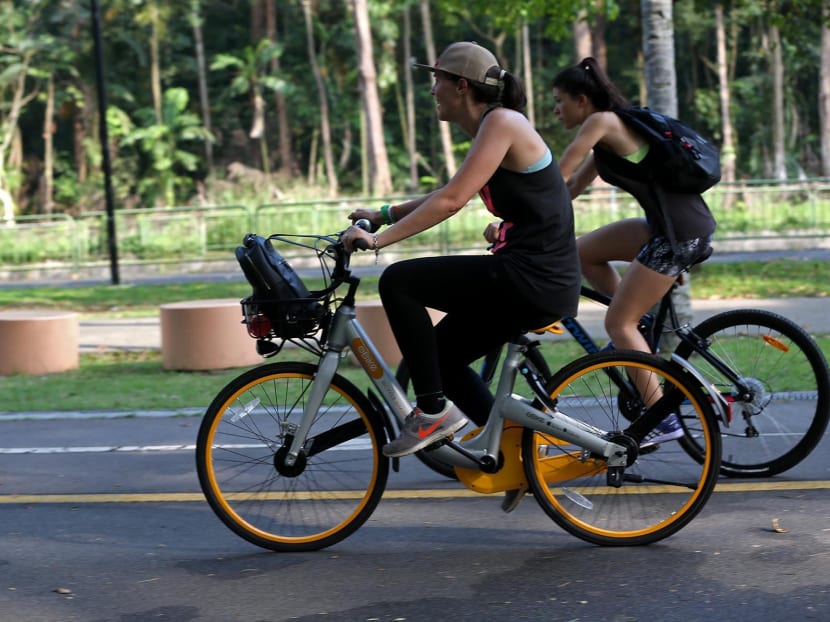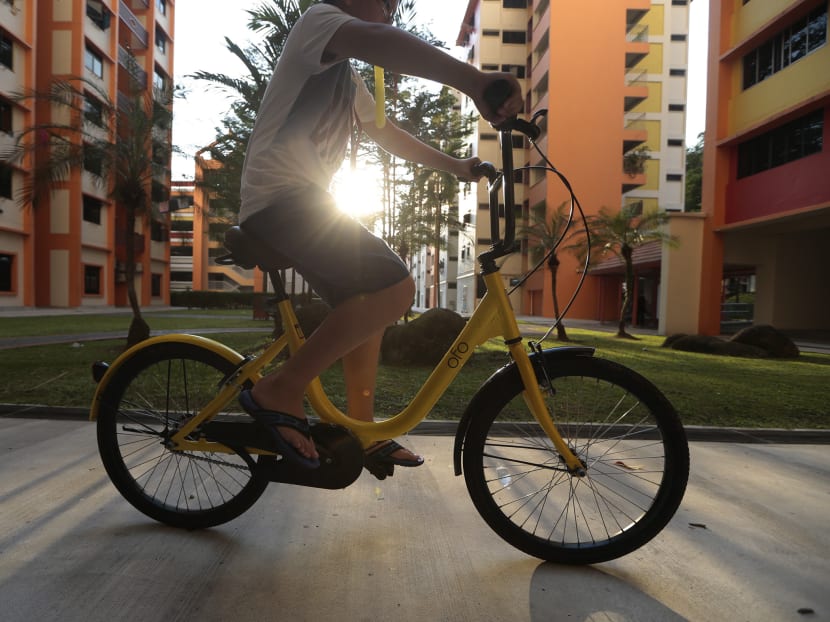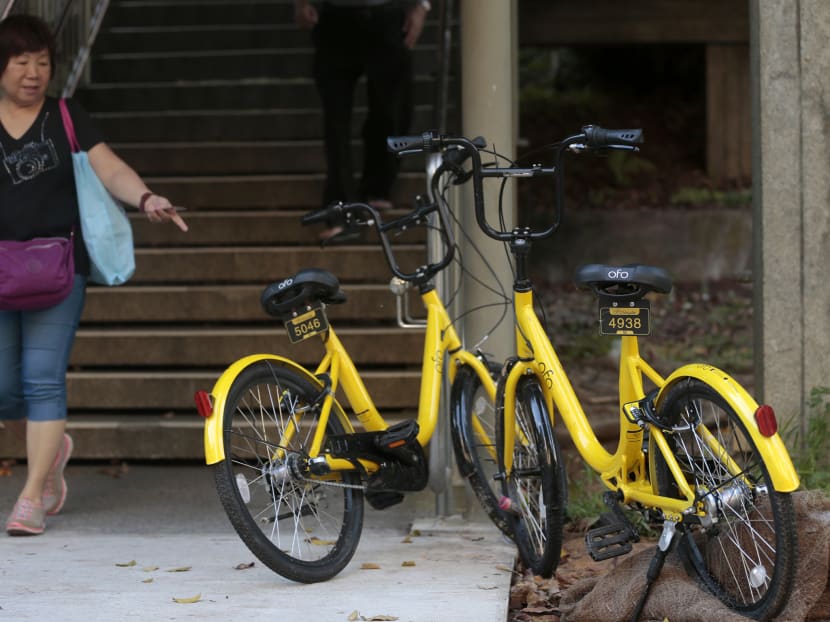After cars, bike-sharing is the next big thing
SINGAPORE — At 7am each morning, while other commuters jostle for a space in the feeder bus service to Boon Lay MRT station, Mr Terry Ng and his wife Maureen, both 44, beat the crowd by zipping to the station on shared bikes, then hopping on the train to the Central Business District. Their routine repeats in the other direction in the evenings, when they knock off from work.





SINGAPORE — At 7am each morning, while other commuters jostle for a space in the feeder bus service to Boon Lay MRT station, Mr Terry Ng and his wife Maureen, both 44, beat the crowd by zipping to the station on shared bikes, then hopping on the train to the Central Business District. Their routine repeats in the other direction in the evenings, when they knock off from work.
Their bike rides, which are 2km each way, cost them almost nothing - saving them a few dollars a day which would have been spent taking feeder buses.
“It used to be ridiculous to squeeze up the bus… The bikes have helped us get to the MRT (station) faster and brought down our transport cost quite a lot. It is an incentive for us to keep fit as well,” said Mr Ng, who works as an engineer.
Some days, the Ngs’ rides don yellow-and-black wheels; other days the get-up is a fluorescent orange. Depending on what they find on their sidewalks, some of these bikes also come with baskets at the front and adjustable seats.
For almost three months now, the couple is part of a growing number of people in Singapore who are embracing dockless bike-sharing - which only made its debut here in January but the industry has since grown rapidly in the last four months. Today, there are at least three private firms providing the service, and their brightly-coloured bicycles are an increasingly common sight all across the island.
Homegrown oBike and Chinese firm Mobike deploy “smart bikes” that can be unlocked by scanning a QR code via mobile apps. They also make use of GPS (global positioning system) technology to track down bikes that have been indiscriminately parked. ofo, founded by former students at the Peking University in China, also deploys stationless bikes but they have to be manually unlocked using a three-digit code sent to the rider’s mobile device.
While all three firms have positioned themselves as convenient first- and last-mile solutions, many users also hop on their bikes for leisure rides during the weekend.
Undergraduate Chua Kaining, for instance, said her first Mobike ride happened “at the spur of the moment”. “My cousin and I were studying for our exams and wanted to unwind, so we decided to download the app,” she said.
The 22-year-old ended up teaching her cousin to cycle using the bikes. “They were light and well-maintained, plus the height was just right for ladies. So my cousin succeeded at cycling for the first time that night. The (rental fees) were also very affordable,” said Ms Chua, who studies linguistics at the National University of Singapore.
With these bikes going for as cheap as 50 cents for 30 minutes’ use and free rides offered every now and then, dockless bike-sharing offered by private companies has taken off quickly - so much so that a government-backed bike-sharing scheme has been shelved. In March, the Land Transport Authority announced that despite attracting tenders from 13 firms, it would put off plans to launch a scheme originally scheduled for year-end, with more than 2,300 bicycles deployed in the Jurong Lake District, as well as Marina Bay, Tampines and Pasir Ris.
With thousands of bikes deployed all over the island, the three firms have plans to introduce several thousands more in the coming years.
The deluge of bicycles which are almost free for use has generally been welcomed by commuters, but owners of traditional bike rental shops are not smiling.
Mr Ang K H, who manages three Coastline Leisure rental shops at East Coast Park and Pasir Ris Park, said his monthly revenue has dropped by as much as 40 per cent since shared bikes — which are available at just a fraction of the S$6 to S$12 that rental shops charge per hour — started wheeling their way to these parks. “Unlike us, the shared bike operators don’t have to pay for rent of the premises or employ as many people,” the 61-year-old lamented.
He believes that should the authorities start designating parking areas for such bicycles in the parks, it could sound the death knell for his business.
In response to the disruption, Coastline Leisure is exploring ways to make bike-renting more convenient, such as by letting users return the bikes at any of the chain’s three stores — a practice already adopted by operators such as Lifestyle Bike N Skate, which operates 10 bike rental shops along the East Coast Park Connector Network.
TEETHING PROBLEMS
But conventional bike rental shops are not the only casualties. Graciousness and civic-mindedness, too, it seems.
The proliferation of dockless bike-sharing has resulted in widespread indiscriminate parking as well as theft and vandalism of the shared bicycles.
Both oBike and Mobike have rolled out carrot-and-stick, community policing schemes which award or deduct credits from users based on their behaviour, which may in turn affect how much they need to pay for the service. ofo has also taken to social media to warn users against abusing their bikes, saying that the firm “would not hesitate to report to (the) police or take legal actions” against such conduct.
By the end of this year, Mobike also plans to introduce what it calls the “Smart Mobike Preferred Location” technology, which will send alerts to a user’s mobile phone if a bike has been parked incorrectly. It also plans to roll out 1,000 parking areas designated for its bikes by year-end to encourage responsible user behaviour and give riders more convenient access to the bikes. The first 50 were launched last weekend.
These parking areas, dubbed Mobike Preferred Locations, can be located via the firm’s app. They come on top of existing authorised parking locations, including public bicycle racks.
‘UBER FOR BIKES’
In China, the dockless bike-sharing revolution — which has taken many Chinese cities by storm — has been dubbed “Uber for bikes”, given its similarities with the ride-hailing app industry, where new start-ups compete aggressively for market share and investments.
Transport experts and economists interviewed by TODAY drew similar parallels, noting that bike-sharing operators are looking at “claiming territory” in the Singapore market for a start, rather than profits.
So far, there has been aggressive price cutting among the firms, with the companies seizing different opportunities to offer free and discounted rides to win favour among riders. “It is like a ‘bleeding game’, where they see who can bleed for the longest… I don’t see how they can recover expenses at current rental rates. It depends on how much they are willing to lose,” said urban transport expert Park Byung Joon of the Singapore University of Social Sciences (SUSS).
At some point, the operators will have to recover their expenses either by increasing rent or tapping on other sources of revenue. Otherwise, they risk bowing out of the game, said Dr Park.
National University of Singapore engineering professor Lee Der-Horng, who specialises in transport research, said the operators will likely look to delivery services, advertising and cashing in on their back-end data - gleaned from users’ commuting patterns - to beef up revenue. “If they only rely on (the money) they get from users, it will not be sustainable,” said Dr Lee.
Approached by TODAY, Mobike and oBike were coy about their ridership and revenue figures. But both firms allude to putting profitability on the back-seat for now. Said oBike’s general manager Elgin Ee: “Right now, we just want to focus on bike-sharing and help change the mindset of people towards gracious bike-sharing.”
Mr Ee said the firm plans to expand its fleet to between 10,000 to 20,000 bikes “in the next months”, up from 1,000 in February. The homegrown firm — which prides itself for “knowing the needs of the local market” — is implementing a one-year pilot at Tampines to promote bike-sharing in the estate, and plans to reach out to more town councils.
Mobike’s head of international expansion Florian Bohnert said the firm’s venture into Singapore — its first foray overseas — is in line with the Government’s vision for a Smart Nation and a cycling-friendly city. “We want the rides to be affordable to people…The firm’s operations in China has proved its business model,” said Mr Bohnert. The firm also plans to share data gathered, such as usage patterns and bike paths, with the authorities to assist in urban planning, he added.
ofo did not respond to TODAY’s queries.
THE ROAD AHEAD
While the Singapore authorities have steered clear of regulating bike-sharing to date, the transport experts raised some concerns which they felt may require the Government’s attention, such as liability when accidents occur.
SUSS economist Walter Theseira said: “If someone was injured, or caused injury to others, because they were riding a poorly-maintained bike, should the system provider bear liability?”
Mobike’s bikes and riders are covered by insurance. oBike said it will address injuries on a “case-by-case basis”.
In China, where children under 12 years old are banned from riding bicycles on public roads, bike-sharing companies are mulling over ways to prevent under-aged kids from using their bikes - after an 11-year-old rider in Shanghai was hit by a car and died.
Dr Theseira and Dr Lee also felt that the problem of indiscriminate parking may require Singapore regulators’ intervention. In Beijing, its municipal government announced in March that it will put in place parking and maintenance guidelines for the bikes by June, including making clear who should take responsibility for the dumped bikes.
Here, the bike-sharing business has also thrown some “chaos” into the organised city that the Republic is renowned for, said Dr Lee. “Singapore is famous for being orderly… If somehow shared bikes can just appear anywhere… This is not the image which we want to convey. The authorities are probably still keeping a watchful eye because the number of improperly-parked bikes are not that significant yet,” he said.
Dr Theseira suggested that town councils and property owners can impound bicycles found on their property if the parking problem becomes severe. He said: “The Government can use current policy tools to address specific problems that may arise...Just like how today, property owners can already take some measures against privately-owned bicycles that are parked inappropriately.”
Apart from competition and errant riders, Dr Lee said the cycling infrastructure here — or the lack of it — is the bigger challenge for bike share operators. “For bike-sharing to really take off here, the Government needs to take a serious review of the current infrastructure, and some of the safety and capacity challenges. And there will be certain costs involved,” he said.
As more and more users come onboard, the teething issues could also be exacerbated. “After word got around and the initiative became more popular, it’s more difficult to find (a bicycle). Also, often, the bike is spoilt, or the GPS location is not accurate,” said Ms Lim Jia Qi, 27, who added that she had once spent an hour looking for a functional bike in Jurong West.






